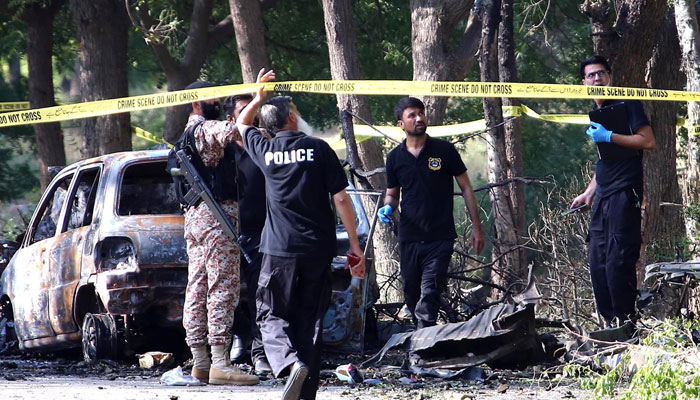Attack on the nation
Convoy was reportedly from the Port Qasim Electric Power Company
Sunday night’s terror attack near the Karachi airport highlighted, yet again, how determined Pakistan’s enemies are to leave it weak and isolated on the global stage. The attack – at a traffic signal near Jinnah International Airport – seemingly targeted a convoy carrying Chinese nationals and resulted in the deaths of at least three people, including two Chinese nationals. Seventeen others were injured in the attack, which the Foreign Office has labelled “an attack not only on Pakistan but also on the enduring friendship between Pakistan and China”. Prime Minister Shehbaz Sharif also condemned the attack and said the perpetrators of this dastardly incident could not be Pakistanis but are sworn enemies of Pakistan. The convoy was reportedly from the Port Qasim Electric Power Company. The attack has been claimed by the outlawed Majeed Brigade, part of the separatist Balochistan Liberation Army (BLA).
This is at least the second time Chinese nationals have been targeted by terror groups in Pakistan this year and at least the third time foreign nationals have been targeted. A convoy of 11 diplomats from 11 different countries was targeted by an IED on September 22 in Swat, Khyber Pakhtunkhwa, martyring one police official and injuring three others and nine Chinese nationals and four Pakistanis were killed after the bus they were travelling in was hit by an explosive-laden vehicle back in March. Then there was the Karachi University bombing in April, 2022, which killed three Chinese teachers and one Pakistani.
This pattern of targeting foreign nationals might offer a window into the thinking of the terror outfits carrying out the attacks. These groups are likely well aware that they do not stand a chance in a conventional military conflict but are also attuned to the economic fragility of Pakistan and its attempts to find a place for itself in a post-US world order. The attacks on foreign nationals strike at both of these perceived weaknesses and highlight the need to improve the protection of foreign nationals in order to secure the economic and geopolitical future of the country. It is also hard to ignore the fact that this attack comes little over a week before Pakistan is scheduled to hold the Shanghai Cooperation Organization (SCO) summit from October 15 to October 16. While Indian Minister for External Affairs S Jaishankar will be attending the summit, this development has only come about after a lot of foot dragging by the Indian side, which appears to have become anaemic to even the appearance of meaningful engagement with Pakistan.
Terror anywhere in the region is a threat to everyone in the region, a fact those supporting militant outfits would do well to remember. Ultimately, it is in everyone’s interest to ensure the South Asian neighbourhood is safe and open for business. No one wants to invest in a region beset by terror attacks and high bilateral tensions. That being said, Pakistan has survived in a hostile environment for over seven decades and now it appears it may even have to learn to thrive in one. This begins by strengthening our internal security. We have to strengthen the institution that can stop terror attacks before they even take place. The police can no longer be underfunded, under-trained, under-equipped and generally neglected at the level they are right now. Security efforts across different law-enforcement agencies also have to be better coordinated. Most importantly, the state has to make clear that it will not tolerate any external or internal attempts to destabilize the country and that the entities responsible for attacks will not be shown any leniency.
-
 Prevent Cancer With These Simple Lifestyle Changes
Prevent Cancer With These Simple Lifestyle Changes -
 Experts Reveal Keto Diet As Key To Treating Depression
Experts Reveal Keto Diet As Key To Treating Depression -
 Inter Miami Vs Barcelona SC Recap As Messi Shines With Goal And Assist
Inter Miami Vs Barcelona SC Recap As Messi Shines With Goal And Assist -
 David Beckham Pays Tribute To Estranged Son Brooklyn Amid Ongoing Family Rift
David Beckham Pays Tribute To Estranged Son Brooklyn Amid Ongoing Family Rift -
 Jailton Almeida Speaks Out After UFC Controversy And Short Notice Fight Booking
Jailton Almeida Speaks Out After UFC Controversy And Short Notice Fight Booking -
 Extreme Cold Warning Issued As Blizzard Hits Southern Ontario Including Toronto
Extreme Cold Warning Issued As Blizzard Hits Southern Ontario Including Toronto -
 Lana Del Rey Announces New Single Co-written With Husband Jeremy Dufrene
Lana Del Rey Announces New Single Co-written With Husband Jeremy Dufrene -
 Ukraine-Russia Talks Heat Up As Zelenskyy Warns Of US Pressure Before Elections
Ukraine-Russia Talks Heat Up As Zelenskyy Warns Of US Pressure Before Elections -
 Lil Nas X Spotted Buying Used Refrigerator After Backlash Over Nude Public Meltdown
Lil Nas X Spotted Buying Used Refrigerator After Backlash Over Nude Public Meltdown -
 Caleb McLaughlin Shares His Resume For This Major Role
Caleb McLaughlin Shares His Resume For This Major Role -
 King Charles Carries With ‘dignity’ As Andrew Lets Down
King Charles Carries With ‘dignity’ As Andrew Lets Down -
 Brooklyn Beckham Covers Up More Tattoos Linked To His Family Amid Rift
Brooklyn Beckham Covers Up More Tattoos Linked To His Family Amid Rift -
 Shamed Andrew Agreed To ‘go Quietly’ If King Protects Daughters
Shamed Andrew Agreed To ‘go Quietly’ If King Protects Daughters -
 Candace Cameron Bure Says She’s Supporting Lori Loughlin After Separation From Mossimo Giannulli
Candace Cameron Bure Says She’s Supporting Lori Loughlin After Separation From Mossimo Giannulli -
 Princess Beatrice, Eugenie Are ‘not Innocent’ In Epstein Drama
Princess Beatrice, Eugenie Are ‘not Innocent’ In Epstein Drama -
 Reese Witherspoon Goes 'boss' Mode On 'Legally Blonde' Prequel
Reese Witherspoon Goes 'boss' Mode On 'Legally Blonde' Prequel




